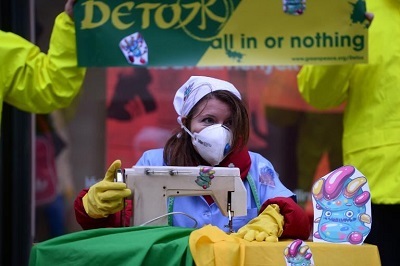 |
Greenpeace activists pretend they are sewing contaminated clothes with chemicals represented by little monsters, during a protest stunt in Budapest on January 14, 2014 (AFP) |
Children's clothing and shoes made by a dozen globally-recognised brands have been found to contain potentially harmful chemicals, Greenpeace said Tuesday.
A new investigation by the environmental campaign group showed that at least one article from every brand was found to have chemicals that "can have adverse impacts either on human reproductive, hormonal or immune systems".
But some of the substances it tested were at concentrations as low as 1mg per kilo, which it described as "the limit of detection", and it was not clear from the statement how many of the samples were above official limits.
The campaign group has issued similar findings before, and in 2012 held a "toxic" fashion show in Beijing to draw attention to its allegation that two-thirds of high-street garments it tested contained harmful chemicals.
Greenpeace analysed 82 products manufactured in 12 different countries, with China the biggest producer on 29.
"This is a nightmare for parents everywhere looking to buy clothes for their children that don?t contain hazardous chemicals," Greenpeace East Asia campaigner Chih An Lee said in a statement Tuesday.
"These chemical 'little monsters' can be found in everything from exclusive luxury designs to budget fashion, polluting our waterways from Beijing to Berlin," Lee added.
Of the products tested, 50 items, or 61 percent, were found to contain nonylphenol ethoxylates, or NPEs, which the group said can break down and become toxic "hormone disrupters".
High levels of PFOA, an ionic perfluorinated chemical that can cause reproductive harm, were also found on some products.
The campaign group said it tested products made by Adidas, American Apparel, Burberry, C&A, Disney, Gap, H&M, Li-Ning, Nike, Primark, Puma and Uniqlo.
The investigation follows previous efforts by Greenpeace to push clothing brands for "zero discharge of all hazardous materials" by 2020.
(
khnews@heraldcorp.com)




![[Herald Interview] 'Trump will use tariffs as first line of defense for American manufacturing'](http://res.heraldm.com/phpwas/restmb_idxmake.php?idx=644&simg=/content/image/2024/11/26/20241126050017_0.jpg)

![[Health and care] Getting cancer young: Why cancer isn’t just an older person’s battle](http://res.heraldm.com/phpwas/restmb_idxmake.php?idx=644&simg=/content/image/2024/11/26/20241126050043_0.jpg)

